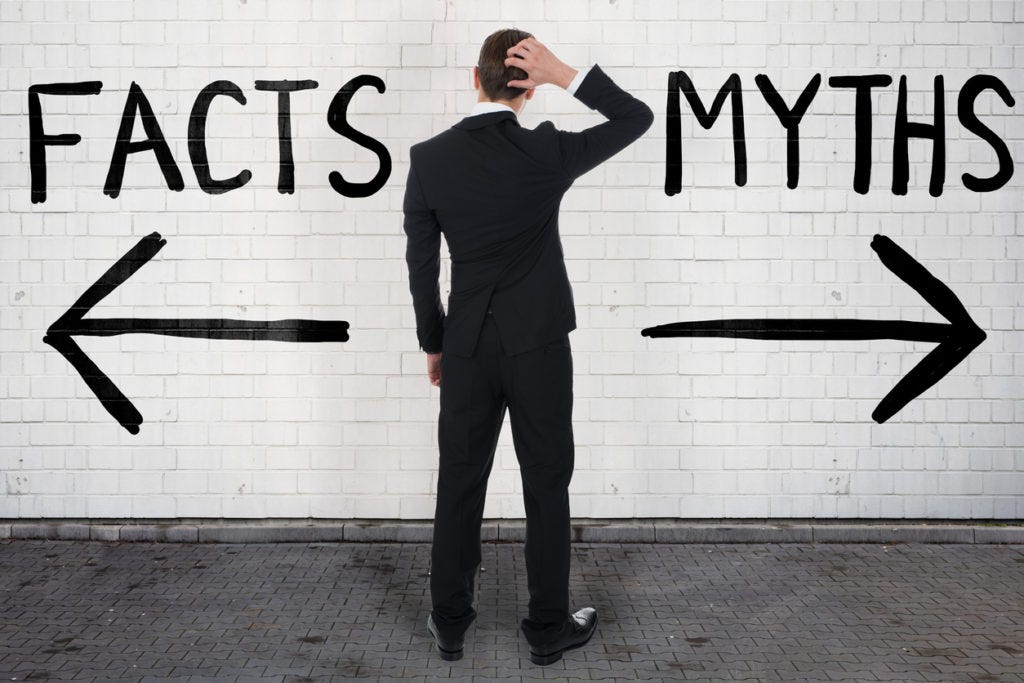You Just Need to Trust the Experts
They know best….or do they?
We all, at times, need to trust experts in our lives. Not everyone knows how to repair a car when something breaks, so we trust auto mechanics, “experts” in the field of automotive repair, to take care of these issues for us. The majority of people lack the knowledge to fix a broken home appliance; thus, experts are called to make sure the washing machine can once again churn out clean clothes. When most people become ill, they seek the services of a doctor who is expected to be an expert in the field of medicine. Even in Jesus’ day, Jews trusted the Pharisees, their religious experts on matters of God’s law and all things religious. There are a plethora of examples where trusting experts comes into our lives. This is because none of us can be an expert in everything.
Each of us takes time to develop expertise in particular areas of knowledge - technology, theology, politics, accounting, medicine, etc. There are endless arrays of subjects on which people choose to delve deep and garner a level of knowledge more extensive than others. Some people do this in multiple fields, but none can be an expert at all. Therefore, there is always someone with more knowledge than ourselves. This is why we call them experts.
“Trust the experts” is a mantra we’ve heard repeated countless times over the past two years. While this sounds like sage advice, and though we all must, at times, do so, there are caveats that must be considered. In logic, there is a fallacy known as the “(Faulty) Appeal to Authority” or “Argument from Authority.” Consequently, there are several ways in which someone can make an appeal to authority that causes their argument to be flawed. For one, an appeal can be made to an authority who is an authority in a different field. For example, going to an auto mechanic for an opinion regarding a medical problem. While an ASE-certified technician may be able to diagnose a blown head gasket on your Chevy’s engine, you would not expect him to diagnose hyponatremia (sodium deficiency) causing edema (swelling) in your legs. Likewise, you wouldn’t seek an opinion from your pediatrician if your air conditioner isn’t cooling properly. These are faulty appeals to authority and can lead us over a cliff.
Another faulty appeal to authority is known as Ipse Dixit, which translates to, “he himself said it.” This would be like Anthony Fauci saying, “I am science! So when I say x, x is true!” It is essentially a self-reference as an authority to make a claim to truth without necessarily presenting evidence.
Though there are others, the last faulty appeal to authority which I am going to address, one which has become rather pervasive over the past several decades, boils down to the question of which authority is trustworthy. This can take two forms, one of which is simply a “he said, she said” type of argument. It pits two authorities with differing positions against one another. The other form is generally known as “Against the Consensus”, which is accepting the position of a smaller contingent of experts when a larger group holds an opposing position. However, it is possible for experts, even the majority of so-called “experts,” to be wrong. It is an unfortunate fact that politics and publicity now heavily influence those in positions of scientific authority. This often results in junk science and even outright lies being promoted as definitive based on the source, rather than upholding the scientific virtues of verifiable, repeatable observation.
We saw a lot of this with COVID-19. We were urged to trust “authorities” such as Anthony Fauci and the CDC, but many very reputable doctors offered differing information from that which Fauci and the CDC promulgated. Those dissenting opinions were fact-checked by supposedly “independent fact-checkers,” in whom many placed their trust. But what level of expertise did any of those fact-checkers have? Are any of them authorities on contagion or epidemiology? How do you decide who to trust? How many have been injured or died as a result of the trust in these “authorities”, either through improper treatment after hospital admission, or because they took an injection they were told is safe and effective, or because of other of their guidance? The fact is, many of the experts upon whom many relied have a history of making false contentions and of being more influenced by politics and/or fame than by evidence.
Likewise, we are encouraged by government to trust the “climate scientists” regarding so called “man-made global climate change.” Statistics are often quoted such as, “97% of scientists believe that we are causing catastrophic changes to the climate.” On what is that claim based? Even on that you will find differing opinions. An article in Forbes magazine asserts that the majority of scientists support the overall claim that man is causing climate change, but that technically, the consensus is less than 97% (they claim in the 80-90% range: https://www.forbes.com/sites/uhenergy/2016/12/14/fact-checking-the-97-consensus-on-anthropogenic-climate-change/ ), while The Frasier Institute claims that this is demagogy and that there is nowhere near 97% consensus (https://www.fraserinstitute.org/article/putting-the-con-in-consensus-not-only-is-there-no-97-per-cent-consensus-among-climate-scientists-many-misunderstand-core-issues). Even if it was true that 97% of scientists agree that the climate is changing, does that mean that the climate change is caused by human activity? Was the climate 100% stable at any point in history? Nevertheless, this is being used to push a political agenda attempting to destroy a vast industry upon which many other products rely, and to transfer wealth, via taxation, from individuals to corporations created to address this contrived crisis.
Many experts now claim boys can be girls, girls can be boys, and men can get pregnant. Despite the biological and moral absurdity, the current Assistant Secretary for Health for the U.S. Department of Health and Human Services believes children should be permitted to undergo irreversibly disfiguring, and in many ways disabling, surgery in order to accomplish this goal. Perhaps even more ludicrous, a professor of law from the University of California at Berkeley recently got into a heated exchange with a Senator during a congressional hearing, claiming that the Senator was fomenting violence by not admitting that men can get pregnant. Are these experts whose guidance should be heeded?
So how do we make heads or tails of all of this? As I already stated, we cannot all be experts on everything. No one has the time or resources to complete all the research that would be necessary to look at all of these subjects. We must, however, approach such topics with healthy skepticism. While not every issue or decision requires years worth of education or combing through thousands of pages of peer-reviewed studies, matters of great import should be considered thoughtfully and critically, especially taking into account potential conflicts of interest, political influences, and financial incentives.
Let us not forget, even Jesus faced similar issues as many who today reject the experts have faced. While He, being God, was certainly the ultimate authority, most Jews were beholden to the experts (the Pharisees) who, by consensus, asserted Jesus wasn’t the Messiah as He claimed to be. They cherished their power and position more than they cared about truth. They fomented lies about Jesus to convince the Jews to turn away, and they threatened excommunication for those who would still chose to follow Jesus. Many would not disagree, at least publicly, with the Pharisees for fear of being ostracized. In the long run, so convinced by their experts were most of the Jews that they requested the government release a murderous insurrectionist and regarding Jesus chanted as a crowd, “Crucify Him!” Because of the groupthink induced by the propaganda of the experts, the Jews brought about the crucifixion of their own Savior.
The government, bureaucrats, and others in positions of authority are not infallible. Let us not make the mistake of believing they are the experts just because they claim to be nor that they are right because of their supposed expertise or claim to have a consensus. We must always maintain the ability to think for ourselves and never succumb to propaganda or mob mentality.








Fake authority:
Bill Gates